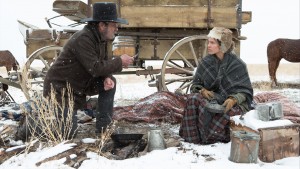The Homesman
The Homesman, 2014, 3 stars
Haunting Homesman
Tommy Lee Jones offers odd anti-Western
From The Orlando Weekly, December 4, 2014
Capturing an exaggerated sense of 19th-century frontier adventure comes easy to many filmmakers. Everyone from John Ford to Clint Eastwood has done it. Re-creating a more realistic loneliness, serenity, and emotional and physical desolation can prove more difficult.
George Stevens accomplished it in 1953 with Shane, Sergio Leone had success in the 1960s, and, more recently, Kevin Costner captured those elements in multiple Westerns – or, if you prefer, anti-Westerns. And though The Homesman, like its characters, stumbles along its stark path, it’s a worthy and deliciously odd addition to the genre, from an unlikely source.
Long considered one of the most mesmerizing actors of his generation, Tommy Lee Jones is not known for his direction. Indeed, this is just his second theatrically released project, following the little-known The Three Burials of Melquiades Estrada nine years ago. And considering that he also co-stars with Hilary Swank and co-wrote the screenplay, based on the novel by Glendon Swarthout, it’s clear Jones put his heart into this project.
It’s the story of a homesman – or, in this case, a homeswoman (a person entrusted with taking immigrants home) – who volunteers to transport three women by horse-drawn wagon across the Nebraska territory, back east to Iowa, in the 1850s. It’s a journey of at least five weeks, in the chilly late winter and early spring – a journey so perilous that no man in town seems up to it. But Mary Bee Cuddy (Swank), a tough and resourceful frontierswoman with no family ties, takes on the responsibility and, through a bizarre set of circumstances, recruits a cantankerous and seemingly selfish coot named George Briggs (Jones) to help her.
The two are tasked not just with conquering the land, the weather and their initial dislike for each other, but also with caring for the women, all of whom have been driven insane by tragedies such as the death of a loved one, a difficult childbirth or the isolation of the prairie. It’s a job their confused and grieving husbands are more than happy to relinquish.
“People like to talk about death and taxes, but when it comes to crazy, they stay hushed up,” Mary is told by the local pastor, portrayed by John Lithgow, in his second strong supporting role in as many months, following Interstellar.
Swank brings both resolve and humanity to her part, but it’s Jones who shines, displaying muted compassion and welcome comic relief. His direction is less sure, though, and requires a good deal of patience from its audience, as his film is filled with a lack of action and an overabundance of short, disjointed, non-impactful scenes, separated too often by the same slow fades.
Even more problematic is a stunning twist late in the second of the story’s three acts that threatens to derail the characters’ journey and the film itself. But the unusual tale ultimately, though just barely, stays on track by embracing its oddness, on the way to a hauntingly empty ending that somehow seems consistent with the bleakness that blankets its entirety.
© 2014 Orlando Weekly / MeierMovies, LLC
